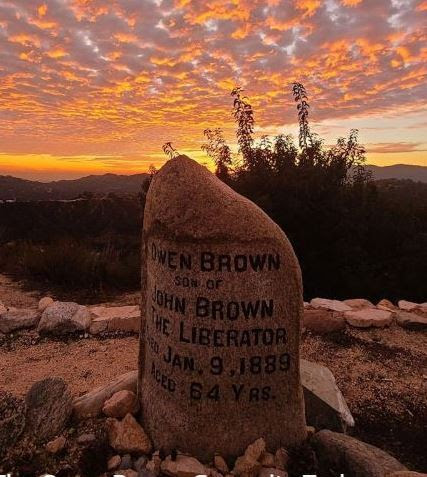
On Tuesday, the Los Angeles County Board of Supervisors unanimously voted to designate renowned abolitionist Owen Brown’s gravesite as a Los Angeles County Historical Landmark.
A commemorative rustic slab of stone and additional smaller stones placed to mark the presumed outline of Mr. Brown’s body currently identify his final resting place in Altadena on a hilltop at the northern end of El Prieto Road.
The landmark designation concludes a nearly year-long process that included a public hearing and administrative work by the Los Angeles County Department of Regional Planning.
“Honoring Owen Brown’s gravesite as a Los Angeles County historical landmark is a powerful reminder of our shared commitment to justice and equality,” said Supervisor Kathryn Barger. “His fight against slavery and unwavering commitment to treating all human beings with dignity and respect reflects his courage and vision. I am proud that we will add his gravesite to our County’s registry of landmarks today. This will help preserve his memory so that future generations can pay homage to his life’s work.”
In February 2024, Supervisor Barger introduced a motion to formally nominate the Owen Brown Gravesite as a historic County landmark. The nomination was catalyzed by the grassroots efforts of local organizations including Altadena Heritage and the Altadena Town Council.
During her remarks, Supervisor Barger also commended the Altadena community for their role in the landmark’s designation.
“I want to recognize and celebrate the bottom-up, community-driven approach that drove today’s landmark designation,” Supervisor Barger stated. “Altadena residents have a deep appreciation for the history of their community. Their efforts go beyond preserving a part of Altadena’s story –they are safeguarding a unique piece of American history. We honor not only Brown’s life and contributions, but also the unwavering efforts of the community members and organizations who fought to preserve his legacy.”
Owen Brown was born on Nov. 4, 1824 in Hudson, Ohio. He was one of 20 children from his father’s (abolitionist John Brown) first family.
At the time of his death, Owen Brown was the last survivor of John Brown’s historic raid on Harpers Ferry. He died in Altadena on Jan. 8, 1889. When his funeral was held two days later, a local newspaper at the time reported, “It was a historic day in Pasadena.”
